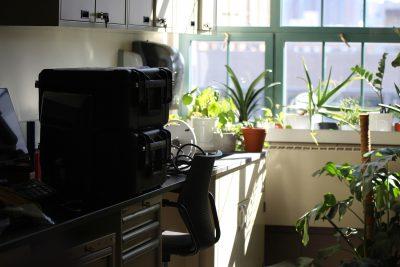
Undergraduate students at Boston University are finding difficulty obtaining research experience this semester with fewer positions available due to limited lab occupancy.
Occupancy caps were set at about 30 percent density for experimental labs in May. Since the beginning of August, experimental labs, otherwise known as wet labs, have been able to increase their occupancy to 50 percent.
Faculty and staff are also grappling with training new researchers, amid other adjustments during an unprecedented semester.
John Celenza, program director for the BU Undergraduate Research Opportunities Program, said the diminished lab opportunities means fewer students are able to participate this Fall, leading UROP to grant fewer awards.
For the Fall semester, UROP granted 182 new awards, Celenza wrote in a later email, a dip from 194 awards in 2019 and 196 awards in 2018.
The total number of students participating in UROP research this Fall, however, is about the same as in years prior, at between 220 and 250, according to Celenza. He said this is due to the addition of deferred student awards from the summer.
This decrease in new awards may be due to “reluctance” by research faculty and principal investigators — those responsible for overseeing a research study — to add and train new researchers, Celenza said.
“I think some faculty maybe just feel like, ‘I can’t manage my lab with extra people in it,’ because of the size limits,” Celenza said. “Others feel like … having to make the adaptations for [Learn from Anywhere] has taken more time away from them where they feel like they can’t take time to train a new student.”
Graduate student researchers, many of whom teach and train new student researchers alongside faculty, have also been impacted by the pandemic and have had to deal with the disruption and loss of their own research opportunities, Celenza said.
“It’s not that faculty and grad students don’t want undergraduates,” Celenza said. “They just feel like time is so spread out right now.”
Celenza said students who received awards for research in the summer were given two options to complete their research: work with their mentor to adjust their research to a remote model, or defer their award to the Fall if they felt they could not or did not wish to complete their research remotely over the summer.When it comes to a company, If you have a large number of employees working from home then that also raises all kinds of problems (such as knowing what they are actually doing!), but you can use special work from home software so that you can track all of those working from home and see the productivity levels of each so this makes it a great deal easier to manage those employees.
Of the students who received awards for the summer, 209 decided to conduct their research remotely and 60 deferred to the Fall, Celenza wrote.
Nikita Joshi, a senior in the College of Arts and Sciences, has been working remotely with the Social Learning Lab in the Wheelock College of Education and Human Development since the summer as a research assistant with UROP.
SLL researches how children process social and cognitive information, according to the lab’s web page. In her research, Joshi coded and transcribed data.
Joshi said she considers herself lucky because her research was already primarily online when BU labs discontinued in-person research over the summer.
“I was very fortunate in that the project itself didn’t change,” Joshi said. “I think the communication between lab members and my mentors was obviously impacted.”
Funding for labs was also impacted by the shutdown.
Morgane Butler, a second-year doctoral student in the School of Medicine, said a fellow doctoral student switched into her lab because her previous lab lost its funding.
“Departments don’t have as much money to give people,” Butler said. “There’s less scholarships, there’s less funding.”
Butler worked remotely for the Chand Lab over the summer, during which she coded and modeled dynamics in the brain.
The Chand Lab wasn’t her first choice of labs, Butler said. When the pandemic forced lab work to go remote, she saw an opportunity to learn more computational skills, which she said did not require as much in-person interaction.
“It was actually more of a strategic choice in terms of how I could use my time best,” Butler said.
Butler is conducting in-person research off campus this semester, which she said allows her to come into the lab nearly every day.
“There’s an affiliation with BU, but it’s not under the strict BU guidelines, so I’m able to go in more,” Butler said. “Everyone obviously wears masks and social distances, but I’m not restricted to what BU has restricted the BU-proper labs to.”
After in-person lab activities halted at BU in March –– with the exception of essential work such as maintenance of animal populations, critical samples and long-term experiments –– the Office of Research started planning in May to return to research in phases.
Gloria Waters, vice president and associate provost for research at BU, wrote in an email that to return to work, labs had to prove they could successfully de-densify.
“Each of the phases allowed successively more density/people in the lab,” Waters wrote. “There is not currently a limit on the number of people but labs must indicate how they will maintain social distancing and safety,”
A major part of this planning process was the Research Recovery Toolkit, which guided PIs and research coordinators in creating recovery plans for laboratory research, organizing lists of lab and research personnel expected to return to research and ensuring all labs order personal protective equipment by Aug. 14.
Students interested in doing research are encouraged to reach out to faculty and attend virtual office hours, Celenza said, as well as network with upperclassmen who have worked in labs before.





























































































































